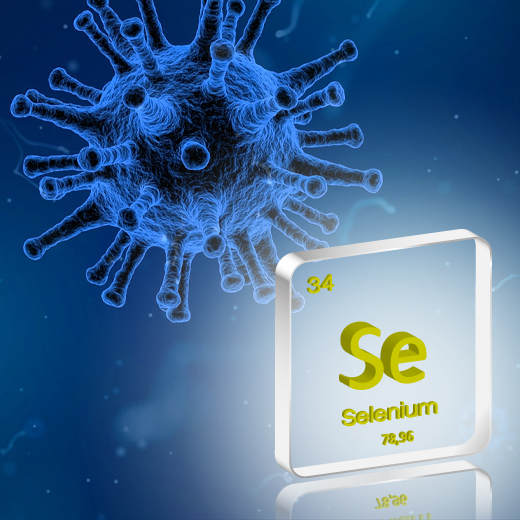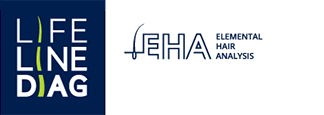 A selenium deficiency can cause many changes in the human immune system, the most important of which is suppression of the immune response to a bacterial or viral infection. Deficiency in selenium leads to quantitative and functional disruption of lymphocytes and other cells of the immune system. Research conducted in recent years has confirmed that the administration of appropriate doses of selenium stimulates the body’s defence response. How does selenium work and why can it be an effective weapon for the immune system?
A selenium deficiency can cause many changes in the human immune system, the most important of which is suppression of the immune response to a bacterial or viral infection. Deficiency in selenium leads to quantitative and functional disruption of lymphocytes and other cells of the immune system. Research conducted in recent years has confirmed that the administration of appropriate doses of selenium stimulates the body’s defence response. How does selenium work and why can it be an effective weapon for the immune system?
As early as 1973, it was discovered that selenium plays a key role in the creation of glutathione peroxidase and other enzymes whose main function is to protect cells against oxidation due oxidative stress. However, increased oxidative stress caused by selenium deficiency is the likely cause of increased progression of infection and weakened immune defence. Thus, it was proven that selenium is essential for maintaining proper immunity and plays a very important role in the prevention of, among others, viral infections.
Studies have shown that people infected with viruses have low selenium levels. This applies both to those who are HIV carriers or have HBV, and those infected with influenza viruses or the Epstein-Barr virus with oncogenic properties.
Selenium supplementation administered for several years inhibited the development of HBV infection and reduced the incidence of primary liver cancer in China, where infection with this virus in the 20th century took on endemic proportions (meaning that it occurred there for many years and remained at a similar level).
The case is similar with the HIV virus – selenium deficiency causes a decrease in the body’s immunity and increases the risk of infection. In patients already infected with this virus, a gradual decrease in selenium levels was found to be in direct proportion to the development of subsequent stages of infection. Patients with AIDS also have lower levels of this element. This is probably one of the reasons that the AIDS epidemic in Senegal slowed down, as the selenium content in the natural environment is high. In neighbouring African countries that are deprived of larger, natural sources of selenium, AIDS has become a major contributor to mortality.
In the light of recent events and in relation to the role played by selenium deficiency in viral infections, SARS should also be discussed, the virus that causing the severe respiratory syndrome, which resulted in a wave of cases and 775 confirmed deaths. Regarding the role played by selenium deficiency in viral infections, it’s worth noting that SARS was first detected in China in the central part of the country, in the Chinese province of Guangdong, i.e. in an area with significant selenium deficiency in the environment.
Top up your selenium levels – look after your immune system – look after your health
Elements other than selenium that also affect the body’s immunity are cobalt, sodium and potassium. And the diagnostic method that allows you to determine the level of these elements and obtain a full picture of the body’s immunity level is EHA – elemental hair analysis.
Do an EHA test today and check your levels of elements essential for your immunity
Lifeline Diag
Bibliography
- Xia Y, Hill KE, Byrne DW et al (2005) Effectiveness of selenium supplements in a low-selenium area of China. Am J Clin Nutr 81:829–834.
- Krzysztof Pyrć, Ludzkie koronawirusy, „Postępy Nauk Medycznych”, XXVIII (4B), Borgis, 2015, s. 48–54.
- Mocchegiani E., Malavolta M. (2018) Role of Zinc and Selenium in Oxidative Stress and Immunosenescence: Implications for Healthy Aging and Longevity. In: Fulop T., Franceschi C., Hirokawa K., Pawelec G. (eds) Handbook of Immunosenescence. Springer, Cham.
- Foster H.D.: Why HIV-1 has diffused so much more rapidly in SubSaharan Africa than in North America. Med. Hypotheses, 2003; 60: 611-614.
- Paweł Zagrodzki, Selen, a układ odpornościowy, Postepy Hig Med Dosw (online), 2004; 58: 140-149.
- Flohe L., Gűnzler W.A., Shock H.H.: Glutathione peroxidase: a seleno-enzyme. FEBS Lett 1973; 32: 57-93.
- Yu Yu, S., Zhu, Y.J. & Li, W.G. Protective role of selenium against hepatitis B virus and primary liver cancer in Qidong. Biol Trace Elem Res56,117–124 (1997).














